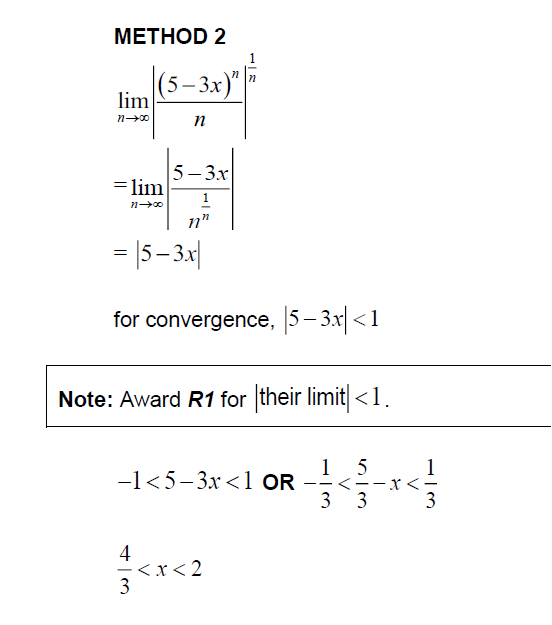Question
Consider the series
\(\sum_{n=1} ^{\infty }\frac{(5-3x)^n}{n}\)
(a) Show that the series is convergent for \(\frac{4}{3}\)< x< 2 . [5]
(b) Find the interval of convergence of the series. [5]
▶️Answer/Explanation
Ans:
(a)
METHOD 1
\(\frac{a^{n+1}}{a_{n}}= \frac{(5-3x)^{n+1}}{n+1}.\frac{n}{(5-3x)^{n}}\)
\(= \frac{n}{n+1}(5-3x)\)
\(\lim_{x\rightarrow \infty }|\frac{a_{n+1}}{a_{n}}= |5-3x|\)
for convetgence, |5-3x|<1
– 1<5-3x<1 or -\(\frac{1}{3}<\frac{5}{3}-x <\frac{1}{3}\)
Note: If a candidate writes a correct inequality, without errors in working, but did not explicitly write the absolute value of their limit, award R0A1.
\(\frac{4}{3}<x<2\)

(b)
consider one of the endpoints
at x= \(\frac{4}{3}, series is \sum_{n=1}^{\infty }\frac{1}{n}\) which diverges (harmonic or p-series)
at x= 2, series is \(\sum_{n=1}^{\infty }\frac{(-1)^{n}}{n}\)
Note: If candidates omit sigma, award A0A1, but subsequent marks can still be awarded.
EITHER
\((\frac{1}{n+1}<\frac{1}{n}\Rightarrow )\)decreasing and \(\lim_{x\rightarrow \infty } \frac{1}{n}= 0 \)
hence series converges at x = 2
OR
which converges by the alternating series test
THEN interval is \(\frac{4}{3}<x \leq 2\)
Question
The function \(f\) is defined by
\[f\left( x \right) = \left\{ {\begin{array}{*{20}{c}}
{\left| {x – 2} \right| + 1}&{x < 2} \\
{a{x^2} + bx}&{x \geqslant 2}
\end{array}} \right.\]
where \(a\) and \(b\) are real constants
Given that both \(f\) and its derivative are continuous at \(x = 2\), find the value of \(a\) and the value of \(b\).
▶️Answer/Explanation
Markscheme
considering continuity at \(x = 2\)
\(\mathop {{\text{lim}}}\limits_{x \to {2^ – }} f\left( x \right) = 1\) and \(\mathop {{\text{lim}}}\limits_{x \to {2^ + }} f\left( x \right) = 4a + 2b\) (M1)
\(4a + 2b = 1\) A1
considering differentiability at \(x = 2\)
\(f’\left( x \right) = \left\{ {\begin{array}{*{20}{c}}
{ – 1}&{x < 2} \\
{2ax + b}&{x \geqslant 2}
\end{array}} \right.\) (M1)
\(\mathop {{\text{lim}}}\limits_{x \to {2^ – }} f’\left( x \right) = – 1\) and \(\mathop {{\text{lim}}}\limits_{x \to {2^ + }} f’\left( x \right) = 4a + b\) (M1)
Note: The above M1 is for attempting to find the left and right limit of their derived piecewise function at \(x = 2\).
\(4a + b = – 1\) A1
\(a = – \frac{3}{4}\) and \(b = 2\) A1
[6 marks]
Question
Let \(f(x) = 2x + \left| x \right|\) , \(x \in \mathbb{R}\) .
a.Prove that f is continuous but not differentiable at the point (0, 0) .[7]
b.Determine the value of \(\int_{ – a}^a {f(x){\text{d}}x} \) where \(a > 0\) .[3]
▶️Answer/Explanation
Markscheme
we note that \(f(0) = 0,{\text{ }}f(x) = 3x\) for \(x > 0\) and \(f(x) = x{\text{ for }}x < 0\)
\(\mathop {\lim }\limits_{x \to {0^ – }} f(x) = \mathop {\lim }\limits_{x \to {0^ – }} x = 0\) M1A1
\(\mathop {\lim }\limits_{x \to {0^ – }} f(x) = \mathop {\lim }\limits_{x \to {0^ – }} 3x = 0\) A1
since \(f(0) = 0\) , the function is continuous when x = 0 AG
\(\mathop {\lim }\limits_{x \to {0^ – }} \frac{{f(0 + h) – f(0)}}{h} = \mathop {\lim }\limits_{x \to {0^ – }} \frac{h}{h} = 1\) M1A1
\(\mathop {\lim }\limits_{x \to {0^ + }} \frac{{f(0 + h) – f(0)}}{h} = \mathop {\lim }\limits_{x \to {0^ + }} \frac{{3h}}{h} = 3\) A1
these limits are unequal R1
so f is not differentiable when x = 0 AG
[7 marks]
\(\int_{ – a}^a {f(x){\text{d}}x = \int_{ – a}^0 {x{\text{d}}x + \int_0^a {3x{\text{d}}x} } } \) M1
\( = \left[ {\frac{{{x^2}}}{2}} \right]_{ – a}^0 + \left[ {\frac{{3{x^2}}}{2}} \right]_0^a\) A1
\( = {a^2}\) A1
[3 marks]
